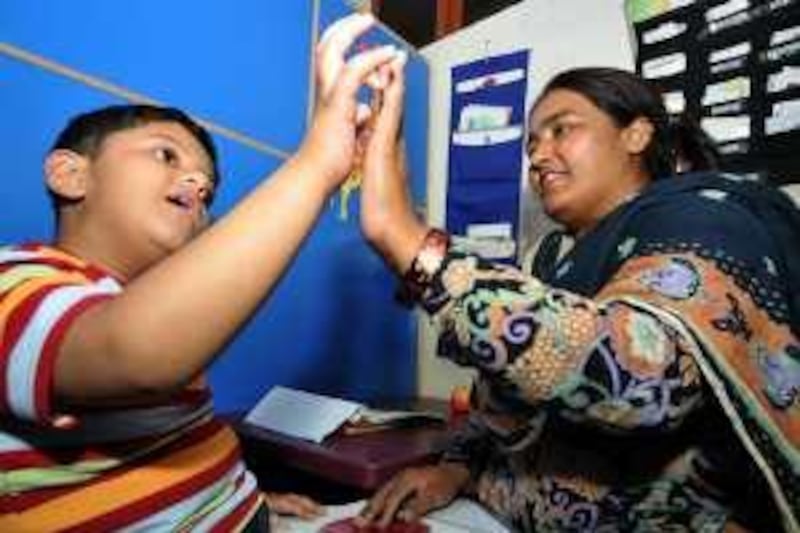LAHORE // Pakistani children born with such neurological disorders as autism have little prospect of a functional adult life because of social ignorance about their condition and an absence of trained professionals to care for them, parents and therapists say. Their lives are made all the more difficult by the lack of any study, national or even regional, about the prevalence in Pakistan of autism, a lifelong developmental disability that affects learning and social interaction, and related conditions like Asperger syndrome, they said.
Shabana Majeed, an independent British speech and language therapist of Pakistani origin, who moved to Lahore last year, said: "In terms of awareness and treatment, Pakistani society is where the United States was in the 1960s." In a series of interviews, parents and therapists said the first and perhaps most daunting of the lifetime of challenges facing the families of afflicted children is their own reluctance to accept that "there is something wrong".
After that, they are likely to be discouraged by members of their extended family, which traditionally wields great influence, from seeking appropriate medical help because of the stigma still widely attached to disabilities in Pakistan. "They are looked upon as becharay [Urdu for unfortunate] all their lives and, usually, kept at home with a maidservant allocated to look after their everyday needs," Ms Majeed said.
Even families without the fear of stigma face equally daunting challenges. Parents of two children in Lahore - one with autism, the other with Asperger - described how they had struggled to find a family doctor or paediatrician qualified to correctly diagnose the conditions. All too often, otherwise competent doctors prescribe the children medication that addresses symptoms, rather than the underlying cause, or are inappropriately treated by therapists whose locally acquired university qualifications are shockingly inadequate, according to Ms Majeed.
Even so, a recent survey by King Edward Medical University in Lahore, soon to be published, found that non-medical health practitioners such as psychologists and speech therapists were more likely to recognise symptoms of neurological disorders than doctors. Mohammed Akbar Khan, corporate manager for a telecommunications firm, described how the family's paediatrician repeatedly failed to spot telltale signs of autism in Zainab, his severely autistic three-year-old daughter.
"When she was not quite two she was smart, but just wouldn't respond to her name being called and would hardly sleep an hour a night, but the doctor would blame it on a persistent ear infection and eczema-like skin dryness," he said. But the sleeplessness and inattention "are classic symptoms of autism and he should have been able to tell us that". Zainab's autism was ultimately diagnosed in Singapore.
Medical science has yet to discover the cause of autism and its increasing global prevalence. Afflicted children are denied admission to mainstream schools, where social stigma surfaces, and the parents have little choice but to place their autistic children in private "special schools". There, too, ignorance means that autistic children are lumped together with classmates suffering from many other but different neurological disabilities - a situation that bodes ill for their chances of developing into socially functional adults.
The Akbar family consider themselves fortunate because they have the fallback of dual Canadian citizenship. Canada, like many western states, offers a national medical and social care system attuned to both the needs of autistic children and their families, who often suffer from clinical depression as a consequence of their child's suffering. Ali Riaz, a wealthy Lahore-based businessman and the father of Ahmed, 17, whose mild form of Asperger was diagnosed by doctors in Britain in 2001, related the trials of being an affected parent.
He said being the father of a young man who suffers from sudden mood swings, anxiety, insomnia and who needs help with personal hygiene had left him emotionally scarred and even shaken his religious beliefs. "There are days when I have panic attacks, and want to run away from everything, just disappear," Mr Riaz said. "And then I remember: what will Ahmed do if I am not there?" Such desperation prompts some parents, even educated ones, to embrace dangerous misconceptions about the possible causes of autism, and agree to unproven treatments that can damage the physical health of their children, therapists said.
"Parents are so vulnerable that they are susceptible to anything offering hope," said Nazish Imran, a child and adolescent psychiatrist at King Edward Medical University. She said autistic Pakistani children would continue to be denied the opportunity to develop into socially functional adults until the government developed a nationwide treatment network at state hospitals. "Until that happens, we can't expect much change."
@Email:thussain@thenational.ae





